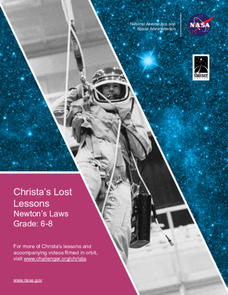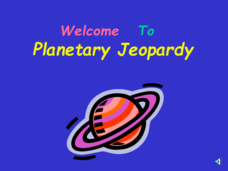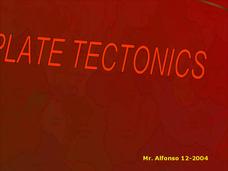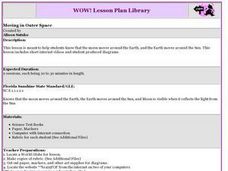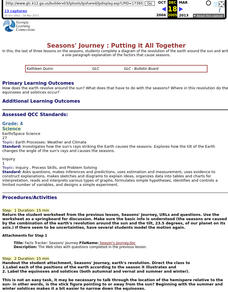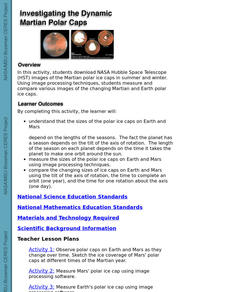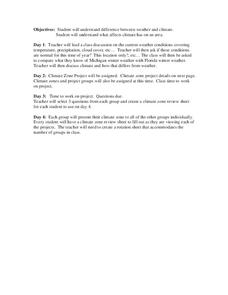Curated OER
Astronomy
Students explore the rotation of the Earth and observe the shapes of constellations. After discussing how the Earth moves. volunteers use a flashlight and globe to model the movement of the sun-Earth system. Using Digitalis technology,...
Curated OER
Plasmasphere
In this plasmasphere worksheet, learners determine how long the plasmasphere takes to rotate around the Earth using two satellite images taken three hours apart.
Curated OER
Long Day?
Young scholars become aware of the effects of tides on the Earth's rotation. In this tides instructional activity, students calculate the number of seconds lost over various periods of time.
University of Colorado
Great Red Spot Pinwheel
The great red spot on Jupiter is 12,400 miles long and 7,500 miles wide. In this sixth part of a 22-part series, individuals model the rotation of the Great Red Spot on Jupiter. To round out the activity, they discuss their findings as a...
International Technology Education Association
Tidy Up Those Sloppy Force Fields!
It is just magnetic. This resource presents the concept of Earth's and another planet's magnetic field and how spacecrafts detect them. Learners study a problem using magnetometers and participate in three experiments to come up with a...
Chicago Botanic Garden
Carbon, Greenhouse Gases, and Climate
Climate models mathematically represent the interactions of the atmosphere, oceans, land, sun, surface, and ice. Part two in the series of four lessons looks at the role greenhouse gases play in keeping Earth warm and has participants...
NASA
Christa's Lost Lesson: Newton’s Laws
How do the laws of motion work in space? Learners explore Newton's laws of motion in different experiments as part of the Christa's Lost Lessons series. They rotate around the room in three stations to experience each law in action using...
PHET
CME Plotting
Young scientists build on their previous knowledge and apply it to coronal mass ejections. By plotting the path of two different coronal mass ejections, they develop an understanding of why most don't collide with Earth.
Star Date
Shadow Play
Three activities make up a solar system lesson that features the sun, its light, and the shadows it produces. Scholars step outside to discover the changes shadows make at different times of day, take part in a demonstration of...
Curated OER
Planetary Jeopardy!
Space Science can be so much fun, especially when you play Planetary Jeopardy! This game tests students on what they know about Roman Gods, the planets and moons in our solar system, and the Earth's rotation.
Biology Class
Plate Tectonics
A great reference to include in the classroom and on your class website, the presentation covers the following topics: Alfred Wegener's theory of continental drift, Pangea, layers of the earth and their properties, convection, plate...
EngageNY
The Motion of the Moon, Sun, and Stars—Motivating Mathematics
What does math have to do with the behavior of the earth and sun? Learn how the movement of celestial bodies has influenced the development of trigonometry. Scholars connects the details in mathematics to their...
NASA
Supernova Chemistry
By measuring the wavelength, frequency, and intensity of electromagnetic radiation, scientists determine the temperature, density, and composition of far away items. Scholars rotate through ten lab stations using a spectroscope at each...
Curated OER
Moving in Outer Space
Students participate in a lesson plan that demonstrates the concepts of rotation and revolution as they pertain to the Sun, the moon, and the Earth. They examine the relative sizes of each. They watch a computer based movie at a...
Curated OER
Exploring the Celestial Neighborhood
Ninth graders study the origin and organization of the solar system. They investigate the Earth's place in the system and how planetary motions explain natural phenomena observable from Earth.
Curated OER
How Far Away is SOHO?
Students create a scale model of the Earth and the sun that demonstrates where the SOHO satellite is in relation to the Earth.
Curated OER
Seasons' Journey : Putting it All Together
Third graders complete a diagram of the revolution of the earth around the sun and write a one paragraph explanation of the factors that cause seasons.
Curated OER
Investigating the Dynamic Martian Polar Caps
Students download NASA Hubble Space Telescope images of the Martian polar ice caps in summer and winter, and measure and compare various images of the changing Martian and Earth polar ice caps.
Curated OER
Ocean Currents
Young scholars discover the geography of Earth by analyzing water currents. In this oceanography lesson, students create visual references on a map of the globe where and why major ocean currents are moving water. Young...
Curated OER
Season's Greetings
Students explore Earth's seasons using an interactive website. For this earth science lesson, students watch video segments and explain Earth's seasonal milestones. They discuss the factors that causes seasonal changes.
Curated OER
Weather Versus Climate
Students differentiate weather and climate. For this earth science lesson, students investigate the climate of a zone they chose. They create a presentation and share their findings with the class.
Curated OER
Jupiter
In this Jupiter worksheet, learners research the answers to five key facts associated with Jupiter including the distance from the sun and how long it takes to rotate around the earth.
Curated OER
How Does the Sun Seem To Move?
In this sun activity, students will fill in the blank of 3 statements about observing the movement of the sun. Then students will fill in the blank of a conclusion they develop from the facts. This activity is a graphic organizer.
Curated OER
#24 Rotating Frames of Reference in Space and on Earth
Learners explore rotating frames of reference, focusing on the weightless environment in space and the Coriolis force.
Other popular searches
- Earth's Rotation
- Earth Rotation
- Earths Rotation
- Earth Rotation Revolution
- The Earth's Rotation
- Earth Rotation Seasons
- Earth's Rotation Craft
- Earth Rotation Around Sun
- Earth's Rotation Seasons
- Earth's Rotation Orbit
- Earth's Rotation and Seasons
- Earth's Rotation on Axis








